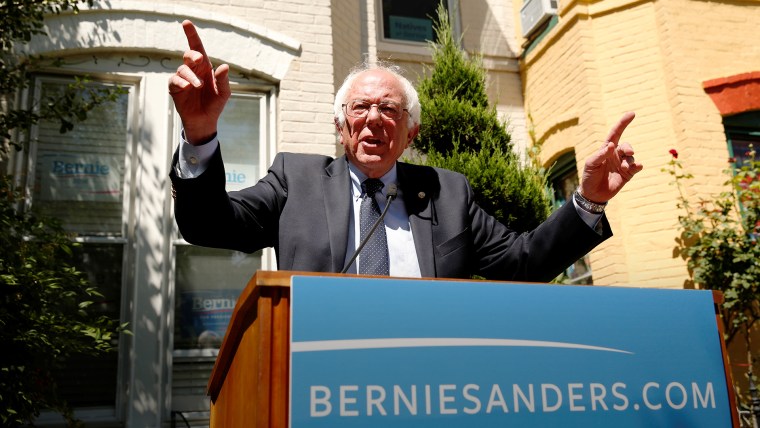After the Democratic presidential primaries and caucuses wrapped up last month, Bernie Sanders and his campaign team had a decision to make: pick the next goal. Despite months of chatter about the senator urging party insiders to overturn voters' will, Team Sanders didn't seriously consider such an approach, knowing it wouldn't work anyway.
Instead, the Vermonter and his aides turned their attention to the Democratic platform, launching a spirited fight to move the document to the left. As of late last week, there can be little doubt that Sanders has succeeded: as MSNBC's Alex Seitz-Wald reported, Dems are moving forward with "what is almost certainly the most progressive platform in the party's history."
The draft platform states Americans should earn $15 per hour and have a right to join a union, and it supports a so-called "model employer executive order" to raise standards for federal government contractors. It calls for the complete abolishment of the death penalty, stating, "It has no place in the United States of America." On Wall Street, the platform lays out a number of reforms proposed by Clinton, Sanders and other Democrats, and states the party "will not hesitate to use and expand existing authorities as well as empower regulators to downsize or break apart financial institutions," it states.
The document, which is available in its entirety, is surprising in its audacity on everything from free community college to expanding Social Security, overturning Citizens United to banning assault weapons, criminal justice reform to repealing the Hyde Amendment that prevents public funding of abortion.
There can be little doubt that many of these provisions and more -- reforming the carried-interest loophole, postal banking, the industry ties of Federal Reserve board members -- can be attributed directly to the Sanders campaign's role in negotiating the terms of the platform. The senator and his team made a concerted effort to move the document to the left, and they achieved their goals in dramatic fashion. The Washington Post's Greg Sargent noted late last week, shortly before the platform draft was released, that Sanders has won "some big victories," and that's absolutely true.
The question is whether that will be enough.
Thus far, officials with Hillary Clinton's campaign and the DNC have been working with Sanders' team, but the senator hasn't won every fight. He wants the platform to oppose the Trans Pacific Partnership, which Democrats are unwilling to put in the document since President Obama supports and negotiated the trade agreement. Sanders also fought for an endorsement of single-payer health care and a new tax on carbon, but the party wasn't prepared to go along with these provisions, either.
That said, as an objective matter, Sanders has had at least as much of an impact on the Democratic platform as any second-place finisher in modern times. The senator may have come up short in the national race, but he nevertheless succeeded in his principal, short-term goal.
And yet, over the holiday weekend, Sanders wrote an op-ed in the Philadelphia Inquirer arguing that his victories aren't enough: the platform, he said, "needs to be significantly improved."
The senator has said more than once during his candidacy that he's prepared to do everything within his power to defeat Donald Trump and elect the Democratic ticket. And while it's very likely that Sanders will follow through on that commitment, it's unclear when, exactly, he'll start pursuing this goal.
We'll never know for sure, but part of me wonders what the presidential race would look like right now if Sanders, once the race for the Democratic nomination wrapped up, had quickly endorsed Clinton, helped unite progressive voters, and focused his energies less on the platform and more on becoming one of the party's leading anti-Trump voices -- all while positioning his movement as a powerful contingent in Democratic politics.
Would his role on the team have produced his platform victories, anyway? Would Clinton's lead in national polling be considerably larger?
